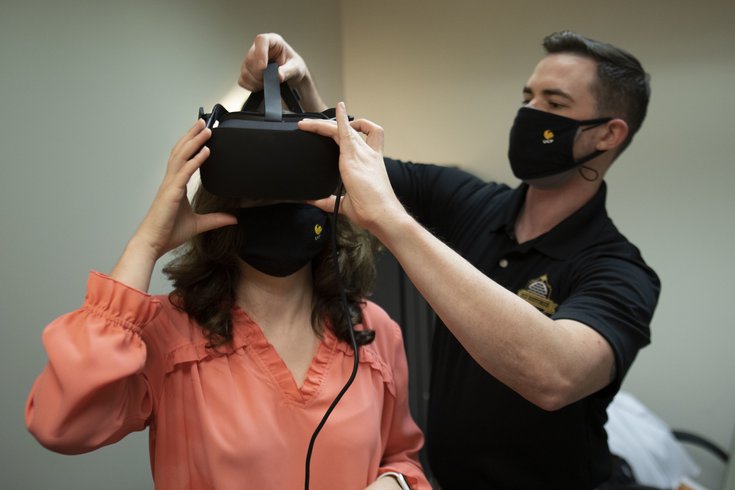
April 28, 2021
 Courtesy of UCF RESTORES/for PhillyVoice
Courtesy of UCF RESTORES/for PhillyVoice
At UCF RESTORES, new virtual reality technology helps treat adults with PTSD.
The use of virtual reality technology in medicine is certainly not a new idea, but the unique ways it is being applied continues to grow.
Virtual reality is an interactive computer-generated experience within a simulated environment that incorporates mainly auditory and visual feedback.
One of the latest ways it's being used is by providing patients with posttraumatic stress disorder with exposure therapy – a behavioral therapy that helps people confront their fears so they no longer avoid objects, activities or situations.
Exposure therapy is also used to treat people with anxiety, panic disorders, obsessive compulsive disorder and phobias. For people living with PTSD, it provides repeated exposure to thoughts, feeling and situations related to a traumatic experience.
Psychologists can provide exposure in different ways – through real life exposure, by asking the patient to recall and describe the experience, or by eliciting the physical sensations that cause distress. All in a safe environment, of course.
Exposing a veteran who was injured in a roadside bomb explosion to repeated simulated driving situations can reduce the stress they feel when trying to get back behind the wheel again. This is just one example of how VR can be used to help treat PTSD patients.
A new VR treatment tool developed by UCF RESTORES, a nonprofit trauma research center and clinic at the University of Central Florida, is now entering clinical trials for adults with PTSD.
Participants ages 18 years or older will receive a pre-treatment evaluation, two weeks of treatment and post-treatment assessments. The tool is customized to each patient's traumatic experience, simulating the sights, smells and sounds of the original trauma.
It has already been used for participants with combat-related trauma and first responders who experienced a traumatic event. After three weeks of treatment, 66% of those with combat-related trauma and 76% of first responders no longer met the diagnostic criteria for PTSD.
"With this tool in hand, we will be able to dynamically recreate scenarios that are customized to each patient's unique experience, ultimately helping them process traumatic memories, put them in their place and regain control of their daily lives," said UCF RESTORES Executive Director Deborah Beidel.
Virtual reality is also transforming medicine in other ways. It is used in medical education to help train surgeons, and in pain management to teach patients how to refocus their attention away from the chronic pain.
Cedars-Sinai Health System is helping doctors better empathize with their patients through VR simulations where they experience specific health conditions.
"It can be challenging for doctors to feel what it's like to have dementia, or what it's like to be a family member taking care of someone with Parkinson's disease or to have a migraine headache," said Dr. Brennan Spiegel, director of Health Services Research at Cedars-Sinai. "All of these examples can be simulated in VR to help doctors better understand what their patients are going through."
"For the person in the VR simulation, the experience is much more impactful than just thinking or learning about it," he added.
Three years ago, the Penn Medicine rolled out a virtual experience in its waiting room at the Roberts Proton Therapy Center for cancer patients who may be feeling stressed or anxious about their treatment.
Patients simply put on a headset to find themselves on a wooden dock by a bay where they can enjoy the sun rise and listen to waves lapping against the shore. For about 10 minutes, they feel transported to a place away from their worries.
VR technology is also being explored as a way to improve balance and muscle control in patients with Parkinson's disease. One study had participants walk on a treadmill and practice stepping over virtual objects. All participants experienced significant improvements in balance and range of motion in their ankles and hips by the end of the study period.
People who are interested in participating in UCF RESTORES' PTSD study can call (407) 823-3910.